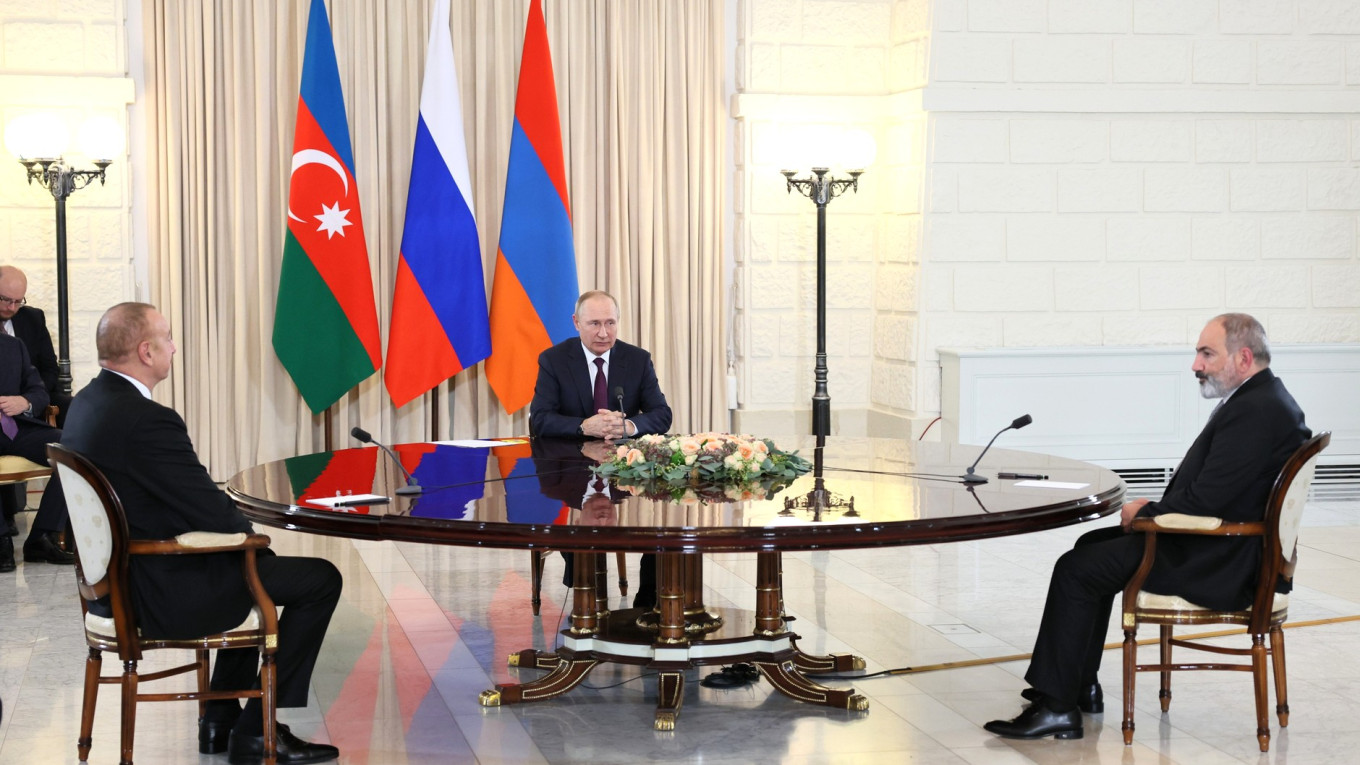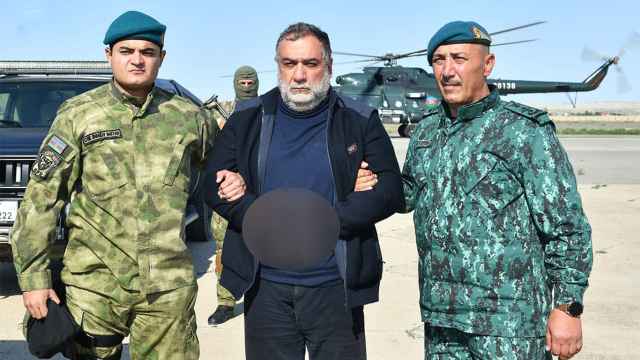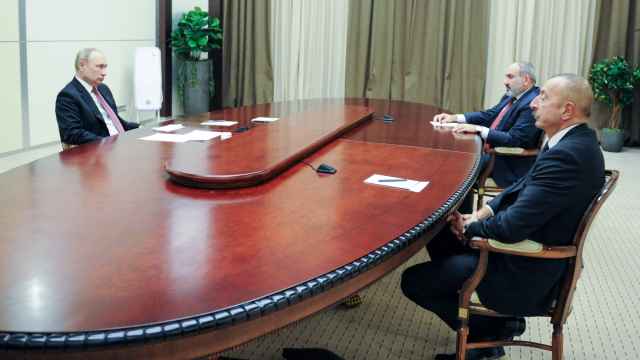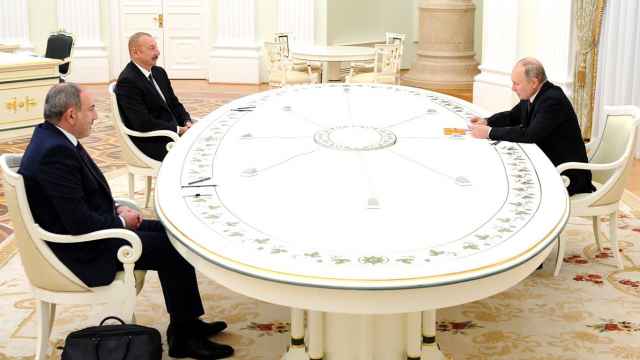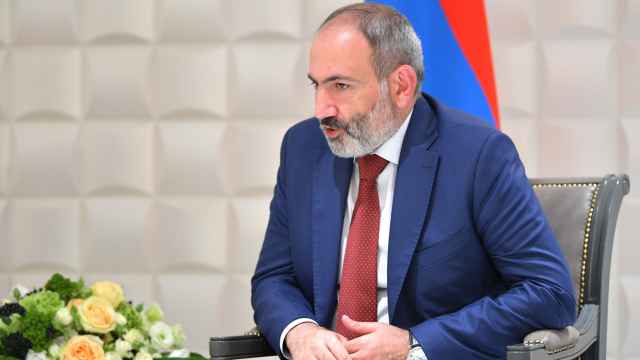Russian President Vladimir Putin said Monday he hopes for "normalization" of ties between rivals Armenia and Azerbaijan who pledged not to resort to force in their territorial dispute after tripartite talks, reasserting Moscow's role as Caucasus powerbroker.
The summit was held as Western engagement grows in the volatile Caucasus region, where Russia — distracted by its war in Ukraine — is palpably losing influence after decades of domination.
The initiative comes a month after the worst clashes between Armenia and Azerbaijan since their war in 2020.
"It was a very useful meeting that created a very good atmosphere for possible future agreements," the Russian president told journalists.
"Russia will do everything to find a definitive and comprehensive settlement" of the conflict, he said. "It is in everyone's interest to normalize relations.
"We will remain in contact and continue the dialogue and the search for the necessary solutions to put an end to this conflict," Putin said.
In a joint declaration after the Russian-mediated talks, Armenia and Azerbaijan "agreed not to use force" to resolve their dispute over the Nagorno-Karabakh territory.
They also agreed "to settle all disputes solely on the basis of the recognition of mutual sovereignty and territorial integration."
Both countries stressed "the importance of active preparations for the conclusion of a peace agreement... to guarantee lasting and long-term peace in the region."
Ahead of the trilateral summit in Russia's Black Sea resort of Sochi, Putin met Armenian Prime Minister Nikol Pashinyan and Azerbaijani President Ilham Aliyev, separately.
"The most important is to ensure peace and create conditions for development," he told Pashinyan.
Ahead of the meeting, Pashinyan said Yerevan's priorities included Azerbaijani withdrawal from the areas in Karabakh controlled by Russian peacekeepers and the liberation of Armenian POWs.
'Impetus'
Putin then received Aliyev, who thanked his Russian counterpart for giving "impetus to the normalization process."
"The Karabakh conflict is already part of history. This issue was resolved two years ago. So there is practically nothing left to discuss in this context," Aliyev insisted.
Armenia and Azerbaijan have fought two wars — in 2020 and in the 1990s — over Azerbaijan's Armenian-populated region of Nagorno-Karabakh.
A six-week war in autumn 2020, which claimed the lives of more than 6,500 troops on both sides, ended with a Russian-brokered deal that saw Yerevan cede swathes of territory that it had controlled for several decades.
Last month, 286 people from both sides were killed in clashes that have jeopardized a slow and halting peace process.
The hostilities ended with a US-brokered ceasefire, after earlier failed attempts by Russia to negotiate a truce.
With Moscow increasingly isolated on the world stage following its offensive on Ukraine, the US and the EU have taken a leading role in mediating the Armenia-Azerbaijan peace talks.
EU chief Charles Michel and French President Emmanuel Macron hosted talks between Pashinyan and Aliyev in Brussels in August.
Following a slew of diplomatic efforts from Brussels and Washington, Armenian and Azerbaijani foreign ministers met on Oct. 3 in Geneva to begin drafting the text of a future peace treaty.
Russia and EU leaders have traded criticism of their respective efforts in the Karabakh conflict, with Moscow and Paris in particular exchanging jabs this month.
Putin recently dismissed a comment by Macron who said Moscow was "destabilizing" the peace process.
Moscow has traditionally acted as a middleman between the two countries, which were both part of the Soviet Union.
Russian peacekeepers
The 2020 ceasefire agreement saw Russia deploy a force of 2,000 peacekeepers to the region to oversee a fragile truce.
Ahead of the talks, Armenia's Pashinyan said he was ready to extend their presence by up to another two decades.
Russia's peacekeeping mission has been criticized by some with even Pashinyan raising concerns about the force, in rare Armenian criticism of its ally.
The EU has announced a "civilian EU mission" to Armenia to monitor ceasefire violations.
Aliyev has vowed to repopulate Karabakh with Azerbaijanis and recently re-opened an airport in the conquered territories.
When the Soviet Union collapsed in 1991, ethnic Armenian separatists in Nagorno-Karabakh broke away from Azerbaijan. The ensuing conflict claimed around 30,000 lives.
A Message from The Moscow Times:
Dear readers,
We are facing unprecedented challenges. Russia's Prosecutor General's Office has designated The Moscow Times as an "undesirable" organization, criminalizing our work and putting our staff at risk of prosecution. This follows our earlier unjust labeling as a "foreign agent."
These actions are direct attempts to silence independent journalism in Russia. The authorities claim our work "discredits the decisions of the Russian leadership." We see things differently: we strive to provide accurate, unbiased reporting on Russia.
We, the journalists of The Moscow Times, refuse to be silenced. But to continue our work, we need your help.
Your support, no matter how small, makes a world of difference. If you can, please support us monthly starting from just $2. It's quick to set up, and every contribution makes a significant impact.
By supporting The Moscow Times, you're defending open, independent journalism in the face of repression. Thank you for standing with us.
Remind me later.


